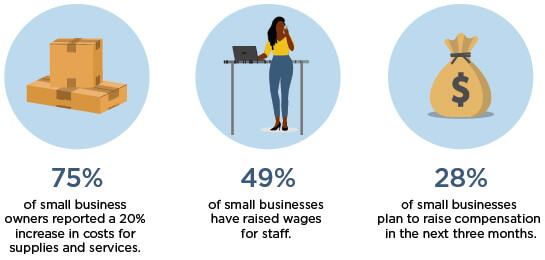COVID-19 caused an economic downturn that small businesses are still dealing with today. In fact, many business owners have been faced with increasing costs due to high inflation. As the Federal Reserve is attempting to curb inflation, businesses need to be prepared for a possible recession. Let’s face it, no one can predict the future. But you can prepare your business for surviving a recession.
What Is a Recession?
A recession is an economic downturn across the entirety of an economy that typically lasts about six months or more, according to The National Bureau of Economic Research (NBER). Recessions are a normal part of the economic life cycle. In a recession, there’s a general decline of economic activity (spending) due to high inflation. As the economy shrinks in a recession, it’s common that some people will lose their job as businesses attempt to cut costs. Increased job loss means less income to spend on non-essential goods and services. Prices and interest rates will increase as the economy attempts to bounce back from a recession.
What Causes a Recession?
There are several reasons for a recession. Often, they’re triggered by unexpected world events like war, pandemics, or financial collapses. In the beginning of the 2020 COVID-19 pandemic there was a high amount of instability and uncertainty about the future. This caused companies and consumers to decrease spending.
We’ve also experienced recessions because of asset bubbles bursting. If a specific industry grows too quickly, their value may rise to an unrealistic price creating an asset bubble. Eventually, asset bubbles will burst causing a recession like we saw in the 2007 to 2008 housing market crash.
Other causes for a recession include:
- Businesses raising prices
- Decreased consumer spending
- Less lending from banks
- Overall decline in the stock market
Price Inflation in 2023

Two years into the global COVID pandemic, rising inflation rates reached a 40-year high. What’s behind the trend? Let’s rewind a few years. During the early months of the pandemic, nearly everyone stayed put. For many, stay-at-home orders lasted even longer. Nearly anyone with the capability to work from home did. Millions of children didn’t go back to school. Instead, they learned virtually from home.
The first prices to rise were in real estate — mainly due to unbalanced supply and demand and not yet full-fledged inflation. To help an uncertain sputtering economy, the Federal Reserve kept interest rates at historic lows. These low rates, paired with people’s ability to work from anywhere and their desire to seek more space and, in some cases, less restrictions, spurred an unprecedented number of home buyers to enter the real estate market.
Stimulus payments flooded into consumers’ bank accounts while a competitive labor market caused wages to rise. Very quickly, consumers had more confidence and more to spend. While demand rose on many fronts, production and manufacturing continued to struggle, frustrated by an interconnected web of labor shortages, materials shortages, supply chain and logistics disruptions, and rising global demand for raw materials.
After vaccinations entered the scene in 2021, travel restrictions eased. More people began to travel and return to work (even if on hybrid schedules), and demand for energy spiked. And amid the rise in energy prices, Russia (the world’s largest oil exporter to global markets) invaded Ukraine. The Western world, including the United States, reacted with severe sanctions. An already crunched energy supply shrunk as governments scrambled to find other oil sources. As anyone at a gas station can tell you, energy prices have skyrocketed.
In a bid to fight further price inflation, the Federal Reserve has begun to increase benchmark interest rates while the central bank has announced a program to reduce its bond holdings. This means borrowing money, including business loans, will be more expensive during a time when costs are rising, and profit margins are narrowing. We’ll discuss how small business owners can protect their business from price inflation, but first let’s answer some common questions about inflation to ensure a baseline understanding.
How Recession Impacts Small Businesses

Businesses of all sizes are impacted during a recession, but small businesses can be hit the hardest. During a recession a smaller firm may experience issues with their cash reserves because they might not have as much coming in as they usually would.
As the economy contracts, consumers will start to spend less money and may even earn less income too. For example, a small law firm may run into issues with cash flow as clients are delaying payments on invoices. This could mean that there’s payments waiting to be filled in your accounts receivable for longer than usual. Small businesses may struggle with paying bills during an economic downturn if you don’t have an emergency fund to tap into. Understanding the risks your small business might face during a recession will help you better prepare.
5 Tips on How to Prepare Your Business for Recession
1. Create an emergency fund
Every small business should have an emergency fund to give them peace of mind just in case an unexpected expense comes up. When something unexpected happens, you’ll know you have cash reserves ready when you need it. One of the first things you can do when creating your emergency fund is to look at your expenses and see what’s non-negotiable for you to cover in an emergency (rent, payroll, and utilities). Knowing what you absolutely need to cover in the event of an emergency can give you a savings goal to start with.
2. Cut unnecessary costs
When preparing your business for a recession, you should look at where your business might be spending money unnecessarily. The best way to cut costs for your small business is to review your expenses regularly. Make it a part of your routine when managing the business to look through your expenses each month and identify areas where you can save. Those small savings from cutting unnecessary costs can be used to start moving money in an emergency savings account.
3. Pay off high-interest debts
It can be helpful to start paying down some of your high-interest debts when a recession is looming. Certain loans may be charged a higher interest rate in a recession. If you make it a priority to pay off some of your high-interest loans you are more likely to avoid having to pay an even higher interest rate. In addition, making progress on paying off debt will help boost your credit score and make it easier to get a line of credit in the future.
4. Renegotiate contracts that no longer work
When preparing to cut back on spending, it may be the perfect time to renegotiate terms with a supplier or partner you may not be too happy with. Evaluate if you have any problems with clients, suppliers, or vendors that you have contracts with. For example, if there is a client that is always late on their payments, it might be the right time to renegotiate your contract with them or start charging a late fee.
5. Keep existing relationships strong
When the economic outlook is unsteady, now is the time to maintain relationships with your clients, employees, suppliers, or vendors. You want to assure them that you value their partnership and look forward to continuing business with them. Communicating with your existing clients and employees will help make them feel confident in your leadership through uncertain times.
How Inflation Impacts Businesses
Inflation could effect businesses in a few ways. Inflation increases manufacturing and production costs. This can drive up the price of goods and services for consumers and businesses, alike, especially when paired with high demand. For businesses, higher expenses can translate to lower profits. When inflation rates seem to be spiraling upward too quickly, governments’ financial entities often make efforts to control it. As we’re seeing now, these efforts can make it more expensive to borrow money.
Inflation’s Effects on Small Business Owners
Nearly three-quarters of small business owners have reported at least a 20% increase in costs for supplies and services, according to a Business.org survey. The National Federation of Independent Businesses (NFIB) reports that 49% of small businesses have raised wages for staff, and 28% plan to raise compensation in the next three months. The trouble is, small businesses don’t have access to abundant savings accounts and capital markets which would make it easier to raise wages the way a large enterprise can. Many feel they simply can’t compete with large companies for labor. Small businesses also don’t have the same buying power, so they may struggle to place significant purchase orders that could help them better manage their own costs. This means they’re often more sensitive to inflation’s squeeze.

When it comes to raising their prices as a way to survive high inflation rates, many small business owners may hesitate for fear of driving away customers. In fact, according to Business.org, 37% of small business owners say customers have complained about higher prices, and 30% think higher prices will deter their customers. But to cope with their increasing costs, 60% of small businesses have raised their prices, according to a Goldman Sachs survey, deciding that they must pass some of their higher costs to customers. Yet, losing customers due to price hikes is a bigger risk than it might be to large businesses with a wider customer base. Perhaps this is why, according to NFIB, small business owners identify inflation as their top concern, overtaking labor quality and labor costs.
How Small Businesses Can Survive Inflation
These eight tips can help you adapt your business to survive inflation, protecting your current income and the future of your small business.
- If you need help with cash flow as inflation continues, consider securing a business loan prior to planned interest rate hikes. If your business could benefit from refinancing its debt, you may consider joining the 16% of small business owners who plan to do so prior to rises in interest rates.
- Analyze your profit margins. Consider the products you carry and services you offer — as well as how continued inflation affects their related expenses. Focus your efforts on the ones that currently perform best for your bottom line. For all others, consider which are most important to your future. If you find that one isn’t helpful to your business now, and you have low expectations for it in the future, consider whether it’s time to remove it from your offering.
- Maintain an open dialogue and a flexible negotiator’s mindset when communicating with your suppliers. Doing so can help you build mutually beneficial, long-term relationships to support both companies during hard times.
- If possible, buy items in bulk. Not only can you stock up prior to further price increases, but you may enjoy volume discounts that drive down the cost per item while also building in an inventory cushion that can insulate your business somewhat from supply chain disruptions.
- Consider raising your prices, but do so strategically. Share news of impending price increases to customers ahead of time if possible. Most people understand and expect that prices will increase across the board, and they’re likely to appreciate the heads up.
- Communicate openly with your customers and, as always, thank them for supporting your small business. You may even consider how to use creative pricing strategies paired with subscription-type orders to help them keep prices down during inflation while maintaining them as long-term customers.
- Focus on improving productivity. Streamline your business processes, and use automation technology when possible. Doing so can help you save on current labor costs, stay resilient when hiring is difficult, and future-proof your business.
- Inflation also affects the cost of replacing equipment and rebuilding should you suffer damage to your business property. Whether you’re running a well-established small business or a start-up, evaluate your current small business insurance to ensure you’re adequately covered for today’s higher costs.
While no one is sure when inflation and its effects will ease, you can use these challenging times as an opportunity to build more resilient business practices. Those who do will not only survive and come out on the other side, but will have gained a wider depth of knowledge and experience to overcome future challenges.
Next steps: Interested in more small business marketing tips? Sign up for the Small Biz Ahead newsletter today.






One of the best articles I’ve read in the past year. Thank you for sharing this information in an easy-to-understand format.
You’re welcome! It’s great to hear that you enjoyed the article. We appreciate the nice comment!
Very informative.
That’s great to hear! We’re glad you found it informative.
Thank you for this article!! You made it very easy to understand.
My husband & I are working owners of a very small environmental consulting & inspection company & are into our 27th year of operation (miraculously!). We were talking just last night about inflation and wondering how it’s calculated. I’m going to share this with everyone here.
That’s awesome, Kate. Congrats on 27 years! We’re so glad the article was helpful!
Excellent note thank you!
You’re welcome!